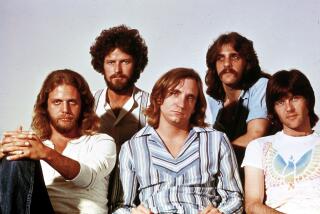‘Tip of the Iceberg’ in Mayor’s Conviction Was Discovered by Accident
- Share via
A key piece of evidence cited as “the tip of the iceberg” by the jury that convicted Mayor Roger Hedgecock of felony conspiracy and perjury Wednesday was discovered by accident a year ago while district attorney’s investigators were pursuing another portion of their case against Hedgecock, interviews with the prosecutor and a review of public documents show.
The evidence was a $3,000 check written to Hedgecock on the account of J. David and Co., the now-bankrupt La Jolla investment firm that was headed by J. David (Jerry) Dominelli. Dominelli signed the check, which was delivered to Hedgecock on Dec. 21, 1981.
In an interview Wednesday evening, jury foreman Richard P. Stark said the Dominelli check was critical to the jury’s conclusion that Hedgecock conspired with Dominelli, former J. David executive Nancy Hoover and former Hedgecock aide Tom Shepard to funnel through Shepard’s political consulting firm tens of thousands of dollars of illegal contributions to Hedgecock’s 1983 campaign for mayor.
“Our real trace was the $3,000 check,” Stark said. “We went through that $3,000 check and started tracing that. That kind of was the tip of the iceberg.”
Prosecutor Charles Wickersham described the check as “a little thing, but a big thing.”
“Here is the direct linkage between J. David Dominelli at one end of the conspiracy and Roger Hedgecock at the other end,” said Wickersham, a deputy district attorney. “And it’s a linkage at the very beginning.”
But it was a linkage that could very easily have been missed by district attorney’s investigators combing through Hedgecock’s financial records. The investigators were basing their research on a trail blazed by the state Fair Political Practices Commission. The commission’s investigation had been limited to a period beginning Jan. 1, 1982--after Hedgecock received the Dominelli check.
“The check was discovered by accident,” Wickersham said.
According to Wickersham’s account and a report filed in Superior Court on March 25 in preparation for Hedgecock’s second trial, investigators originally believed that a contract purporting to document Hedgecock’s relationship with political consultant Shepard was a forgery. They suspected that the contract had been drawn up after the fact to refute allegations that Shepard was providing free political services to Hedgecock even before the two had a formal written agreement in August, 1982.
“We thought it was a phony,” Wickersham said.
The contract mentioned a $3,000 payment to Hedgecock from Shepard in exchange for Shepard’s use of a computer list of Hedgecock’s political supporters. Investigators, suspecting that no such payment was ever made, asked Hedgecock and his attorneys to document it.
“We never thought they would,” investigator James Hamilton said in an interview Thursday.
Much to Hamilton’s surprise, Michael Pancer, Hedgecock’s attorney, responded that the mayor had proof showing the $3,000 payment was made and thus the contract was legitimate. Pancer, in fact, wrote a testy letter to Hamilton on Oct. 22, 1984, complaining about the district attorney’s suspicion that the Shepard-Hedgecock contract was a fake.
“We are quite busy getting ready for a trial on November 1st,” Pancer wrote. “In spite of this demand on mine and the mayor’s time, we are attempting to obtain for you documentation showing that a $3,000 deposit was made to Roger Hedgecock’s account. As soon as we have that documentation, we will supply it to you.”
Soon afterward, according to Hamilton’s written account, Pancer gave him a copy of a Dec. 21 bank deposit slip in the amount of $3,000. But Pancer refused to hand over a copy of the check itself.
It was not until Nov. 13, 1984--one week after Hedgecock was reelected to a full four-year term--that the district attorney’s office and the grand jury obtained through a subpoena a copy of the check. Much to their surprise, it was a J. David & Co. check signed by Dominelli.
That revelation came too late for the charges in connection with the check to be included in Hedgecock’s first trial, which ended in February with the jury deadlocked 11-1 for conviction. But the check was introduced as evidence in that trial in support of the conspiracy charge, and it was included as part of two new counts that were added to the indictment for Hedgecock’s second trial.
Hedgecock claimed in the first trial that the check was given him by Tom Shepard. He said he considered it payment from Shepard, not Dominelli, because Shepard told him Dominelli was advancing the consulting business’s start-up costs.
Although Hedgecock did not testify in his second trial, his defense attorney, Oscar Goodman, attempted to portray the same explanation of the check through his cross-examination of prosecution witnesses. Judging from the verdict and statements from the jury’s foreman, that explanation fell short.
Pancer said Thursday that he could not recall the exact chain of events that led to the discovery of the check.
Wickersham said he wasn’t surprised at the impact of the piece of evidence only discovered by a stroke of luck.
“We could have just accepted the contract as legitimate, and we never would have found that check,” Wickersham recalled Thursday. “When we found it, it was like discovering gold. It was so important to us.”
More to Read
Sign up for Essential California
The most important California stories and recommendations in your inbox every morning.
You may occasionally receive promotional content from the Los Angeles Times.













